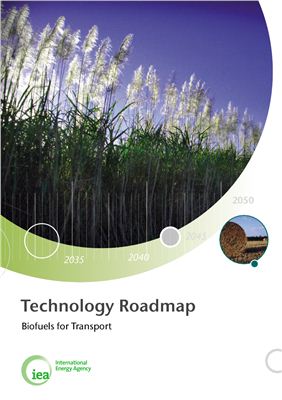OECD / IEA, 2011. 56 p. ISBN:9789264118461
The roadmap describes the steps necessary to realise this ambitious biofuels target; identifies key actions by different stakeholders, and the role for govement policy to adopt measures needed to ensure the sustainable expansion of both conventional and advanced biofuel production.
Biofuels could provide up to 27% of total transport fuel worldwide by
2050. The use of transport fuels from biomass, when produced sustainably, can help cut petroleum use and reduce CO2 emissions in the transport sector, especially in heavy transport. Sustainable biofuel technologies, in particular advanced biofuels, will play an important role in achieving this roadmap vision.
Table of contents
Foreword
Table of Contents
Acknowledgements
Key Findings
Key actions in the next 10 years
Introduction
Rationale for biofuels
Roadmap purpose
Roadmap process, content and structure
Biofuels Status Today
Overview
Conventional and advanced biofuel conversion technologies
Algae as biofuel feedstock
Biorefineries
Sustainability of Biofuel Production
Greenhouse-gas emissions
Other sustainability issues
Criteria and standards
Vision for Technology Deployment and CO2 Abatement
Biofuel deployment
Advanced biofuel deployment: the capacity challenge
The Importance of Land and Biomass Resources
Overview on land and bioenergy potential estimates
Meeting the roadmap targets
Biomass and biofuel trade
Economic Perspectives
Biofuel production costs
Total costs for biofuel deployment
Milestones for Technology Improvements
Conventional biofuels
Advanced biofuels
Feedstock and sustainability
Towards sustainable feedstock production and use
Improving GHG performance
Enhancing biomass and fuel trade
Policy Framework: Roadmap Actions and Milestones
Overcoming economic barriers
Creating incentives for biofuel deployment
Addressing non-economic barriers
Research, development and demonstration support
Inteational collaboration
Biofuel deployment in developing countries
Conclusion: Near-term Actions for Stakeholders
Appendix I: Additional Biofuel Technologies and Blending Characteristics
Appendix II: Acronyms and Abbreviations, Relevant Websites and Literature, Workshop Participants and Reviewers
Acronyms and abbreviations
List of relevant websites and selected literature for further reading
Workshop participants and reviewers
References
The roadmap describes the steps necessary to realise this ambitious biofuels target; identifies key actions by different stakeholders, and the role for govement policy to adopt measures needed to ensure the sustainable expansion of both conventional and advanced biofuel production.
Biofuels could provide up to 27% of total transport fuel worldwide by
2050. The use of transport fuels from biomass, when produced sustainably, can help cut petroleum use and reduce CO2 emissions in the transport sector, especially in heavy transport. Sustainable biofuel technologies, in particular advanced biofuels, will play an important role in achieving this roadmap vision.
Table of contents
Foreword
Table of Contents
Acknowledgements
Key Findings
Key actions in the next 10 years
Introduction
Rationale for biofuels
Roadmap purpose
Roadmap process, content and structure
Biofuels Status Today
Overview
Conventional and advanced biofuel conversion technologies
Algae as biofuel feedstock
Biorefineries
Sustainability of Biofuel Production
Greenhouse-gas emissions
Other sustainability issues
Criteria and standards
Vision for Technology Deployment and CO2 Abatement
Biofuel deployment
Advanced biofuel deployment: the capacity challenge
The Importance of Land and Biomass Resources
Overview on land and bioenergy potential estimates
Meeting the roadmap targets
Biomass and biofuel trade
Economic Perspectives
Biofuel production costs
Total costs for biofuel deployment
Milestones for Technology Improvements
Conventional biofuels
Advanced biofuels
Feedstock and sustainability
Towards sustainable feedstock production and use
Improving GHG performance
Enhancing biomass and fuel trade
Policy Framework: Roadmap Actions and Milestones
Overcoming economic barriers
Creating incentives for biofuel deployment
Addressing non-economic barriers
Research, development and demonstration support
Inteational collaboration
Biofuel deployment in developing countries
Conclusion: Near-term Actions for Stakeholders
Appendix I: Additional Biofuel Technologies and Blending Characteristics
Appendix II: Acronyms and Abbreviations, Relevant Websites and Literature, Workshop Participants and Reviewers
Acronyms and abbreviations
List of relevant websites and selected literature for further reading
Workshop participants and reviewers
References

